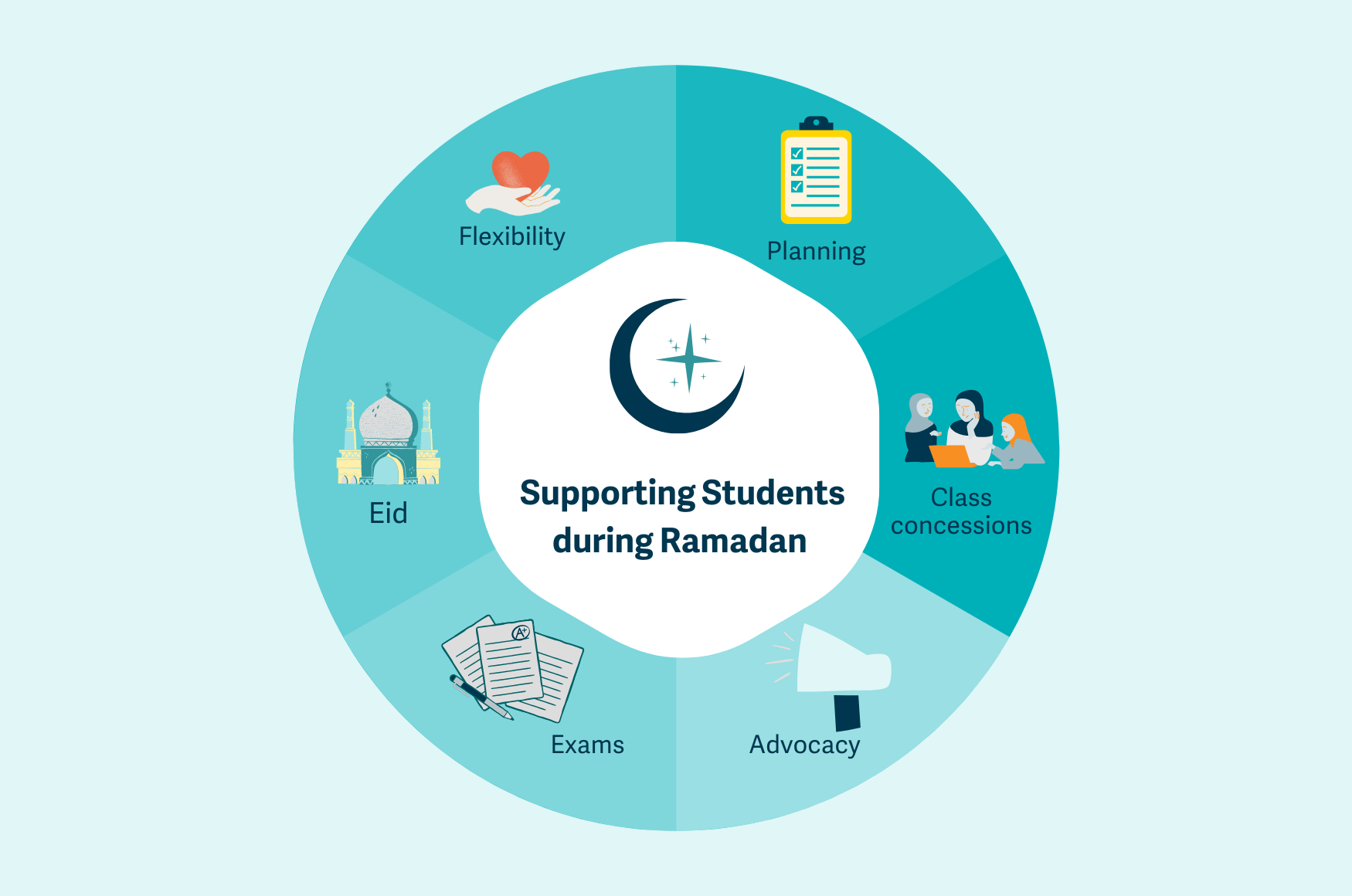Ramadan Guidelines for Staff and Faculty
Ramadan is a sacred month for Muslims around the world, characterized by a full month of obligatory fasting and a spiritual cleanse. When this holy month overlaps with exam season, Muslim students may have increased anxiety around meeting deadlines, altered sleep patterns, changes in energy levels and commitment to prayer timings.
In collaboration with Student Affairs and the Multi-Faith Chaplaincy, Intercultural Storyteller Amna Qazi has developed guidelines for staff and instructors on how to support Muslim students throughout Ramadan.

Ramadan is the ninth month of the Islamic lunar calendar and a time of spiritual/personal cleansing, reflection and self-improvement. While it is a month of fasting, Ramadan is more than just forgoing food and water for the daylight hours. Muslims take inventory of the year — what went well, what didn’t and how to improve. Fasting is symbolic of practicing self-control and perseverance. Muslims endeavour to reach taqwa, a heightened form of self-awareness and awareness of accountability to oneself and to God. While fasting, Muslims use self-control during periods of hunger and persevere through challenging emotions such as anger since swearing, yelling or harming people that can invalidate the fast.
Improving compassion, self-improvement and spiritual cleansing are the overall goals of Ramadan. Generally, every healthy adult is required to fast. People who menstruate do not fast during their period, as it is considered difficult to endure (e.g., cramps that would prevent someone fasting from taking pain medications). Seniors can choose not to fast depending on their personal health needs, and pregnant and breastfeeding people do not need to fast as the baby's and parent's health is the priority. Individuals who are ill or travelling can make up their fasts at a later date. Individuals who live with chronic illnesses that prevent them from fasting may pay a fidya, a special donation made to those in need, in lieu of fasting.
While fasting is considered an obligatory act of worship for Muslims and is one of the pillars of Islam, it is important to consider that Muslims are at varying levels of practice and that you may encounter some Muslims who choose not to fast. To respect people’s personal boundaries, please refrain from inquiring why they are not fasting.
Here are some ways to support students:
- Flexibility: Be adaptable with deadlines. Ramadan fasts can range from 18 to almost 20 hours during the summer months, making it difficult for students to maintain their energy levels. If a student asks for an extension, strongly consider granting it.
- Make concessions: Another pillar of Islam is the five daily prayers, which become even more essential for Muslims during Ramadan. Allow a short class break for students who request it to complete their prayers. You may wish to discuss break timings with your student ahead of time to promote an easy transition.
- Plan: Ideally, two to three weeks before Ramadan, you can meet with your students to discuss a plan . Students may not be expecting co-operation or support and may not approach you first. Work out a plan for extensions, last-minute extensions, prayer times and academic concessions in advance, but remain open to flexibility as students may overestimate their ability to maintain energy while fasting.
- Advocate: Be an ally in your department for students who are fasting or observing Ramadan. Share this blog in a department meeting to inform others and to remind other staff/faculty to be flexible.
- Exams: Students should be allowed a short break during exams to complete their prayers. If Muslim students are writing an evening exam, they should be given 15 minutes to complete their evening prayer and break their fast. An invigilator may accompany them if needed. You might also consider having Muslim students begin the exam immediately after they break their fast and complete their prayers.
- Eid: Ramadan ends with Eid, a major holiday for all Muslims that lasts two days. On the first day of Eid, a special prayer service is held that is essential to attend. Please offer and allow students the day away from classes for them to commemorate with their families.
Throughout this process, contact the Office of Student Affairs for guidance on responding to student concerns. If a student needs help asking for support from instructors, student case managers can assist with starting the conversation. A student can book an appointment with a case manager by phone or email. Additionally, Intercultural Learning is available to help instructors and students navigate this process. The Multi-Faith Chaplaincy is home to a Muslim chaplain who can provide advice on religious concessions. If there are questions, concerns or need for support, please contact Ahmed at chaplain@ayeshamosque.com
Ramadan Planner Form